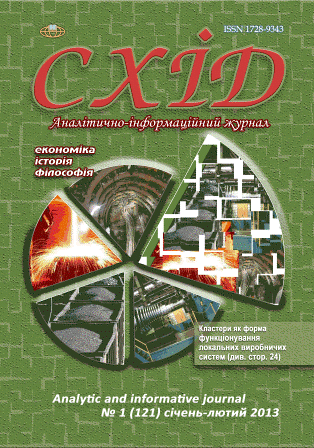On Verbal Tools To Open Our Past And Future Wider
DOI:
https://doi.org/10.21847/1728-9343.2013.1(121).13431Keywords:
past, future, development, law, forecast, history, language, grammar, logic, cognitionAbstract
The article substantiates a need to widen the arsenal of lingual and logical tools of historical and prognostic kinds of thinking offering to remove some restrictions as biased and braking. It is argued that human history is only enriched with human modal logic, in particular with the Conditional Mood that has been repressed by the objectivists. Also discussed are principles of linguistic futurology that is tabooed by narrow-minded political interest. A study of trends and laws of development in dynamic lingual sphere allows the author to foreсast some results of the interaction of Ukrainian, Russian and English in Ukraine. As it always has been under similar circumstances in the past, one observes changes today in each tongue in the media of mixing along with a contest of variants of the future lingual hybrid.
Downloads
References
Bosch, Rodger. Stephen Hawking: Off Earth by 2110?, available at: http://cosmiclog.nbcnews.com/_news/2010/08/09/4850998-stephen-hawking-off-earth-by-2110?lite
Chomsky, Noam. Lecture delivered at the Musical Academy in Madras on 10 November, 2001. Ukrainian translation: Чомскі Н. Куди прямує світ? In: Критика, 2002, № 1-2.
Fahey, Mike. Stephen Hawking Thinks The Earth Should Probably Start Packing, available at: http://kotaku.com/5609574.
Nobel Prize in Literature, available at: http://en.wikipedia.org/wiki/Nobel_Prize_in_Literature.
Stephen Hawking’s Warning: Abandon Earth - Or Face Extinction // Big Think. - 6 August, 2010, available at: http://bigthink.com/ideas/21691.
Downloads
Published
How to Cite
Issue
Section
License
Copyright (c) 2013 Vitaliy Radchuk

This work is licensed under a Creative Commons Attribution-NonCommercial-NoDerivatives 4.0 International License.
1. Authors bear responsibility for the accuracy of facts, quotations, numbers and names used.
2. Manuscripts are not sent back.
3. The publisher does not always agree with the authors' opinion.
4. The authors reserve the right to authorship of the work and pass the first publication right of this work to the journal under the terms of a Creative Commons Attribution-NonCommercial-NoDerivatives 4.0 International License. This license allows others to distribute (copy) the published work for non-commercial purposes, provided there is mandatory attribution to its authors and a link to the first publication in our journal.
5. The authors have the right to conclude separate supplement agreements that relate to non-exclusive work distribution in the form in which it has been published by the journal (for example, to upload the work to the online storage of the journal or publish it as part of a monograph), provided that the reference to the first publication of the work in this journal is included.

